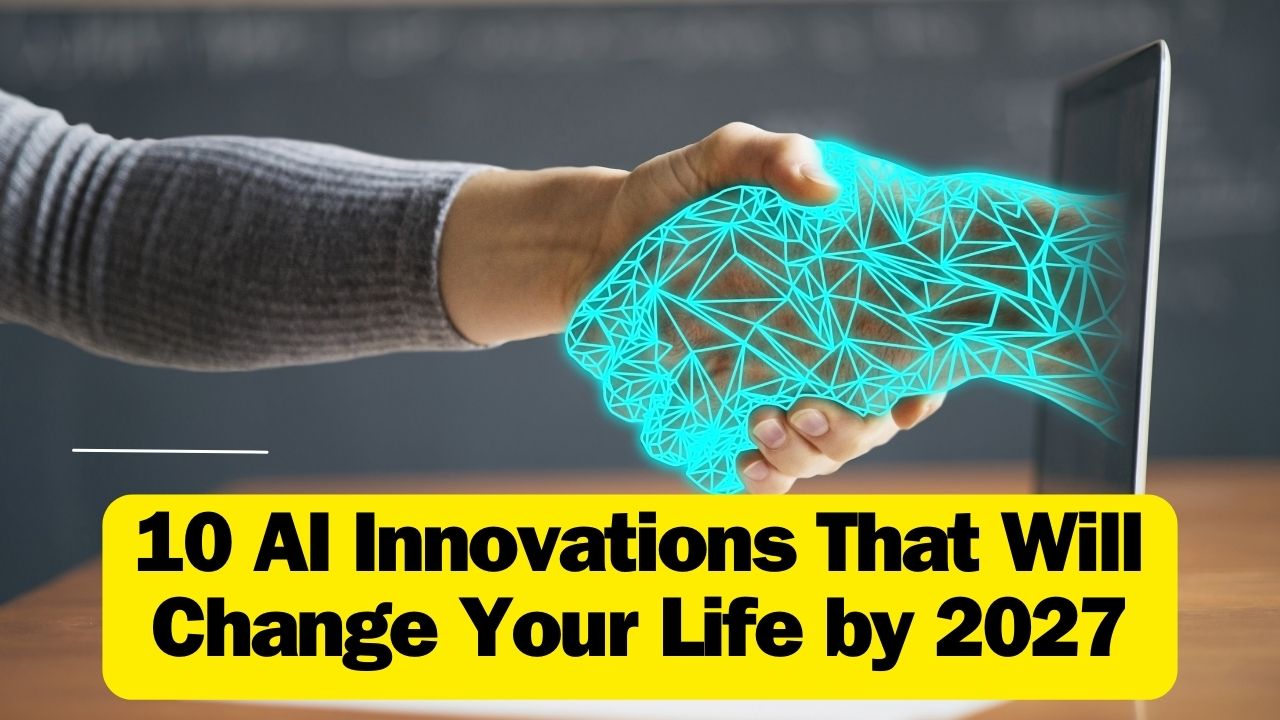Artificial Intelligence (AI) is on the verge of transforming our lives in unprecedented ways, and by 2027, we can expect a revolution touching every aspect, from our daily routines to major industries. In this article, we delve into the top 10 AI innovations set to redefine how we live and interact with the world.
1. Artificial Intelligence Agents: Your Digital Companions
In the next four years, having your own AI assistant will become the norm. Imagine a digital companion assisting you in planning vacations, managing social connections, and even providing personalized recommendations. This AI software will understand and respond to your natural language, making interactions seamless and personalized. The future involves having a constant companion that not only handles tasks but also understands the nuances of your life.
2. Fully Automated Self-Driving Vehicles
Self-driving technology is advancing rapidly, and in the coming years, we can expect fully automated self-driving vehicles to redefine transportation. With major car companies investing in machine learning, these vehicles will use AI and advanced sensors to navigate traffic, offering a safer and more efficient commute. Imagine a world where accidents are minimized, and travel time becomes an opportunity for other activities.
3. AI with IoT: Smarter Homes and Cities
The collaboration between AI and the Internet of Things (IoT) is set to make our everyday devices smarter. From adjusting home temperatures based on preferences to optimizing traffic flow in smart cities, this fusion will enhance our lives. Picture a future where your AI-powered assistant communicates intelligently with devices, making your surroundings responsive to your needs.
4. Advanced Virtual Reality (VR)
Virtual Reality is not just for entertainment; it's poised to revolutionize how we experience different realities. From exploring ancient civilizations to immersive educational experiences, VR will offer more realistic and interactive encounters. As technology advances, VR will continue to transform how we play, learn, and connect with others in a digitally immersive way.
5. Augmented Reality (AR): Enhancing Daily Experiences
Unlike VR, Augmented Reality (AR) enhances our daily experiences by adding computer-generated elements to the real world. From following virtual arrows on the sidewalk to trying out furniture before buying it, AR opens up exciting possibilities. It goes beyond gaming, enriching how we look, learn, shop, and navigate the world around us.
6. Brain-Computer Interface (BCI): Connecting Thoughts and Actions
BCI will redefine how we interact with technology, allowing communication between the brain and external devices. Imagine sending messages or playing games using just your thoughts. This technology holds immense potential, not only for those with mobility challenges but for everyone, offering new ways to communicate and control our surroundings.
7. 6G Edge Computing: A Seamless Internet Experience
The combination of 6G and Edge Computing will transform how we connect to the internet. This duo promises a faster, more reliable, and seamlessly connected internet experience. From online gaming without delays to instant connections with smart devices, this technology will make everything more responsive.
8. Robotic Process Automation (RPA): Streamlining Tasks
RPA involves creating software robots that mimic human actions on computers, handling repetitive and rule-based tasks efficiently. Businesses are increasingly using RPA to streamline operations, and in the next few years, this technology will continue to change how we handle routine tasks, freeing up time for more creative and complex work.
9. Nanochip Integration in Healthcare: Precision and Efficiency
Nanochips will play a crucial role in transforming healthcare by making medical devices more advanced and precise. Imagine tiny devices navigating your bloodstream to detect and treat medical conditions at a cellular level. This technology promises highly efficient and targeted healthcare solutions, from early disease detection to precise drug delivery.
10. Precision Agriculture with AI: Sustainable Farming
AI-powered farming techniques will revolutionize precision agriculture. Smart integration of technology, including AI, will optimize every step of the farming process, from irrigation to pest control. This not only enhances productivity but also ensures a more environmentally conscious and sustainable approach to agriculture. AI in precision agriculture contributes to global food security and promotes environmentally sustainable practices.
In conclusion, the next few years are set to witness a remarkable transformation in how AI innovations reshape our lives. Staying informed about these advancements is crucial for adapting to the evolving world and ensuring you are not left behind. The future promises a seamlessly connected, efficient, and personalized lifestyle, thanks to the groundbreaking innovations in artificial intelligence.
Here's a FAQ: 10 AI Innovations That Will Change Your Life by 2027
Q1: What are AI innovations, and how will they impact our lives by 2027?
A1: AI innovations refer to advancements in artificial intelligence technology. By 2027, these innovations are set to revolutionize various aspects of our daily lives, from personal interactions to major industries.
Q2: How will AI agents change the way we interact with technology?
A2: AI agents, or digital companions, will become the norm, assisting with tasks like planning, social interactions, and providing personalized recommendations. These agents will understand natural language, making interactions more intuitive and user-friendly.
Q3: What can we expect from fully automated self-driving vehicles in the next few years?
A3: Self-driving technology is improving rapidly, and by 2027, fully automated self-driving vehicles will transform transportation. These vehicles will use advanced sensors and AI to navigate traffic, offering a safer and more efficient commute.
Q4: How will AI collaborate with the Internet of Things (IoT) to make our lives smarter?
A4: AI and IoT will work together to create smarter homes and cities. Devices like smart locks and lights will communicate intelligently, optimizing our surroundings based on preferences and needs, making our environments more automated.
Q5: What role will virtual reality (VR) and augmented reality (AR) play in our future experiences?
A5: VR will offer immersive computer-generated environments, while AR will enhance our real-world experiences by adding computer-generated content. These technologies will transform how we learn, play, shop, and interact with the world.
Q6: How will brain-computer interfaces (BCI) redefine our interaction with technology?
A6: BCIs will enable communication between the brain and external devices, allowing thoughts to control actions. This technology holds potential for a wide range of applications, from aiding people with mobility challenges to enhancing cognitive abilities.
Q7: What is 6G Edge Computing, and how will it impact internet connectivity?
A7: 6G Edge Computing combines super-fast data transmission with faster response times, revolutionizing internet connectivity. This duo will make the internet faster, more reliable, and seamlessly connected, enhancing our online experiences.
Q8: How does robotic process automation (RPA) streamline tasks in various industries?
A8: RPA involves using software robots to handle rule-based and repetitive tasks efficiently. It is not limited to physical robots but includes software that mimics human actions, making processes more streamlined across industries.
Q9: What role does nanochip integration play in the future of healthcare?
A9: Nanochip integration involves using minuscule computer components for advanced and precise medical tools. This technology holds promise for personalized medicine, enabling early disease detection and targeted drug delivery.
Q10: How will AI-powered farming techniques contribute to precision agriculture?
A10: AI in precision agriculture will optimize farming processes, increasing crop yields while minimizing resource usage. Smart sensors and drones will collect data for real-time decision-making, promoting sustainable and environmentally conscious farming practices.
Written By: Muktar

























